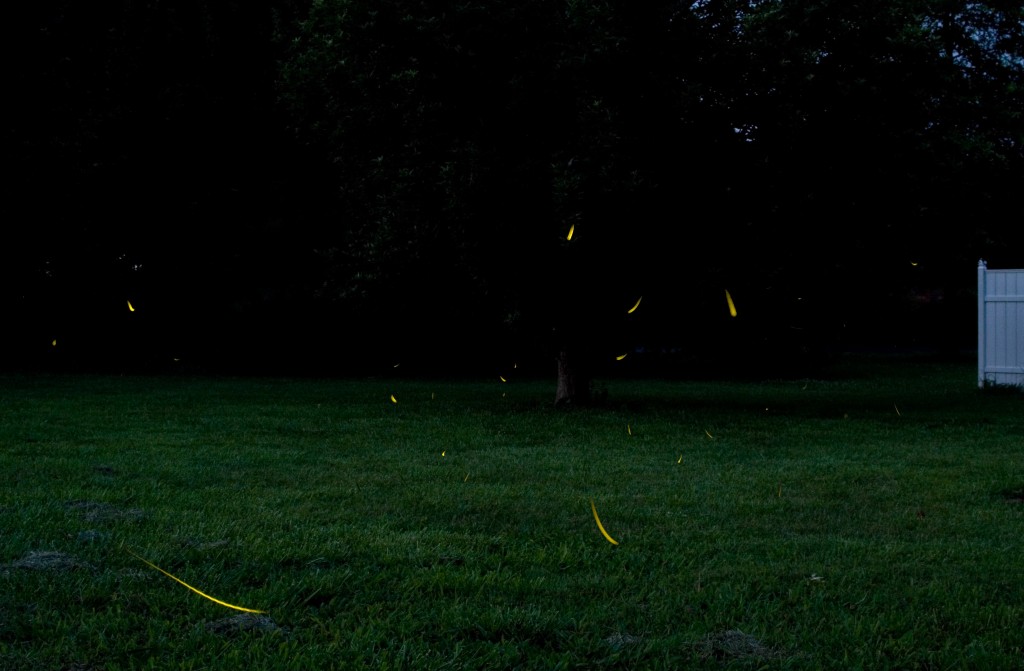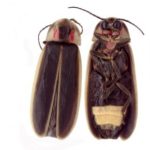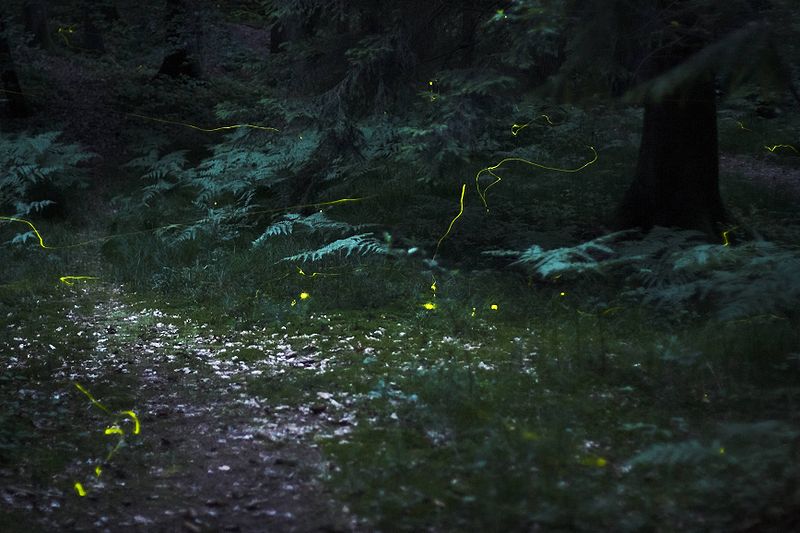 One of the well-thumbed books in our house is Gary Larson’s There’s a Hair in My Dirt!, which chronicles the adventures of a daffy maiden who sees nature through a rose-colored magnifying glass. She cuddles up to invasive squirrels, delights over frolicking fawns, and beats the heck out of a snake as it tries to suffocate a mouse. (The mouse carries a virus that kills Harriet, the maiden, for her trouble).
One of the well-thumbed books in our house is Gary Larson’s There’s a Hair in My Dirt!, which chronicles the adventures of a daffy maiden who sees nature through a rose-colored magnifying glass. She cuddles up to invasive squirrels, delights over frolicking fawns, and beats the heck out of a snake as it tries to suffocate a mouse. (The mouse carries a virus that kills Harriet, the maiden, for her trouble).
I usually laugh along until I come to the part about fireflies. Harriet squeals over these magical, fairy-like creatures (which, Larson points out, are actually beetles)—and I cringe, because squealing is exactly what I do, too.
I grew up in the West, which apparently has no fireflies, so the first time I saw fireflies I was 23 and in a bus that lumbered up Costa Rica’s continental divide. I’d fallen asleep in the steamy afternoon; when I woke, the inside of the bus was quiet and I could barely see the silhouettes of other passengers. Outside, moss-draped trees loomed only one shade darker than the surrounding sky.
Then, a few sparks seemed to appear among the trees. Suddenly, they were everywhere, flashing in the darkness. The rocking bus, the sleepy noises of the other passengers, and the flickering outside made the whole evening feel like it was another layer of dream.
My other firefly sighting is dreamy, too: they backlit a Minnesota midsummer’s eve that also involved a lot of mead (and a long discussion about Moby Dick, which I had never read).
Recently, I started wondering what was keeping fireflies away from my own backyard, where the only bright display is a string of bulbs that are probably better suited to an aging French café.
 I’m not the only one. The west does, in fact, have fireflies, but they just don’t flash. Sara Lewis, at Tufts University, says that while there’s a chance that flashing firefly species never made the trip over the Rockies after the last glaciers retreated, something else must be at work. In the 1920s, people tried to bring flashing fireflies to Portland’s parks without any luck. Since most of a firefly’s life takes place underground, it’s possible that something—moisture level, soil type–isn’t quite right for flashers’ subterranean larvae. So much for my pipe dream of smuggling them back from my next trip east. (And now I’m probably on a California Department of Food & Agriculture watch list—so much for breezing through the border station at Truckee with a smile and a wave).
I’m not the only one. The west does, in fact, have fireflies, but they just don’t flash. Sara Lewis, at Tufts University, says that while there’s a chance that flashing firefly species never made the trip over the Rockies after the last glaciers retreated, something else must be at work. In the 1920s, people tried to bring flashing fireflies to Portland’s parks without any luck. Since most of a firefly’s life takes place underground, it’s possible that something—moisture level, soil type–isn’t quite right for flashers’ subterranean larvae. So much for my pipe dream of smuggling them back from my next trip east. (And now I’m probably on a California Department of Food & Agriculture watch list—so much for breezing through the border station at Truckee with a smile and a wave).
There’s so much going on a summer evening that, when I do find fireflies in their natural range, I should think of the display as a college bar scene on overdrive instead of an ethereal Lothlorien.
 Lewis and her colleagues have looked at several aspects of the fireflies’ flashes. Producing the bioluminescent flash costs a male firefly about as many calories as a walk does for us—not too taxing–but a super-flashy signal also attracts a predator firefly, Photuris. Photuris’s presence might be what’s kept male fireflies from getting too showy over the years. And those Photuris females are extra-tricky—they can switch from responding to a male they’d like to mate with to a male they’d like to eat. (Even a pub’s worst maneaters don’t make their victims look like the decimated fireflies in this video — although it probably feels that way sometimes).
Lewis and her colleagues have looked at several aspects of the fireflies’ flashes. Producing the bioluminescent flash costs a male firefly about as many calories as a walk does for us—not too taxing–but a super-flashy signal also attracts a predator firefly, Photuris. Photuris’s presence might be what’s kept male fireflies from getting too showy over the years. And those Photuris females are extra-tricky—they can switch from responding to a male they’d like to mate with to a male they’d like to eat. (Even a pub’s worst maneaters don’t make their victims look like the decimated fireflies in this video — although it probably feels that way sometimes).
In my few firefly sightings, I noticed none of the call and response between male and female, the double-flash of Photinus greeni, the sneaky mimicry of the Photuris. I just saw glowing lights. But if I could see fireflies every night, would these lights would lose their glow? After all, I find my eyes sliding away from even the most star-flecked sky after finding a few familiar landmarks—the Big Dipper, Orion’s belt, the round and obvious moon.
I’m starting to think learning more about fireflies—or anything—can help me hang on to the initial feeling of otherworldly wonder. If I knew more constellations, maybe I’d spend longer stretches out under the night sky. If I could recognize six firefly species in a single twilight field, or have a conversation with them using a trusty flashlight (as Lewis can), perhaps every firefly-lit night would be as full of wonder as my first two. Each night, knowing more, I’d only unpeel another onion layer of how much it was that I don’t know.
Lewis, who is now looking at how fireflies deter potential predators, hasn’t had to choose science over spectacle. “Every field season I give myself at least one night to simply go out and immerse myself in the awe of it all,” she says. Maybe that’s what I should aim for, fireflies or not–one summer night of awe.
Bonus—songs I like that feature fireflies!:
Fireflies, Owl City
Darkness Between the Fireflies, Mason Jennings
Song for the Fireflies, Josh Ritter
__________
Cameron Walker writes about science and a few other things from her home in California. www.cameronwalker.net, @camonthecoast
Her stories: Depth Afield, Grunion Run (p 63), Digging Deep
Photo credits (in order): night fireflies – David Fant; Photinus – National Park Service; Photuris – Bruce Marlin; firefly garden – Quit007
We sit on our front porch most nights in the summer here in North Carolina, for a cool drink and conversation, and to watch the fireflies. Don’t worry — they never get old.
So good to hear that the magic lasts (along with the joy of warm nights, cool drinks and good company). Thanks for reading.
once upon a time, I lived in New Jersey. We had a seemingly inexhaustible supply of fireflies in our backyard. It was so wonderful to watch them. A favorite children’s activity was to catch them and put them in large jars with air holes and grass. We would put these jars by our beds so that we could watch them blink all night.
when I moved beck to the west coast, it was the one thing that I really really missed. I too have thought about bringing some here, but I am also acutely aware of the problems with invasive species, so won’t actually do it, but it would be great to have them around, they are so magical.
@manyshoes, I just learned that we do have glowing marine fireworms here. I’m not sure if they’re quite as magical, but they still sound very cool.